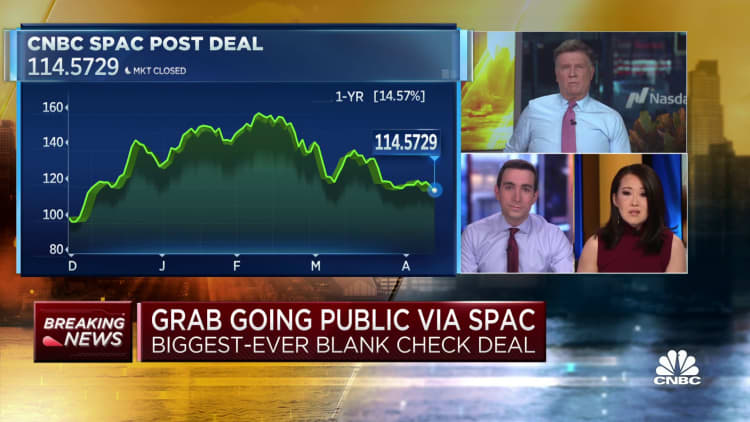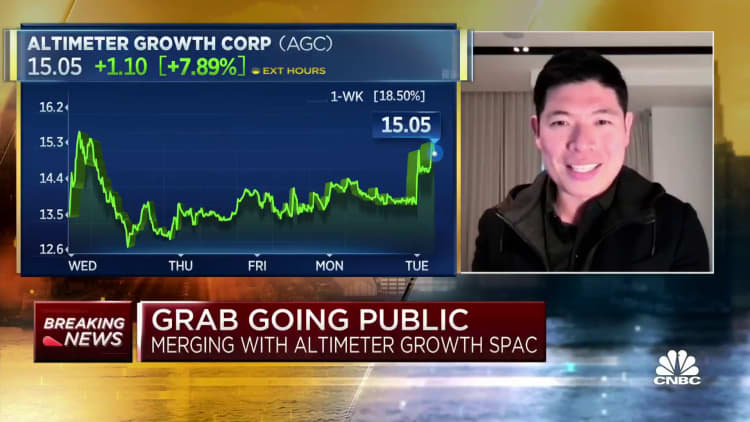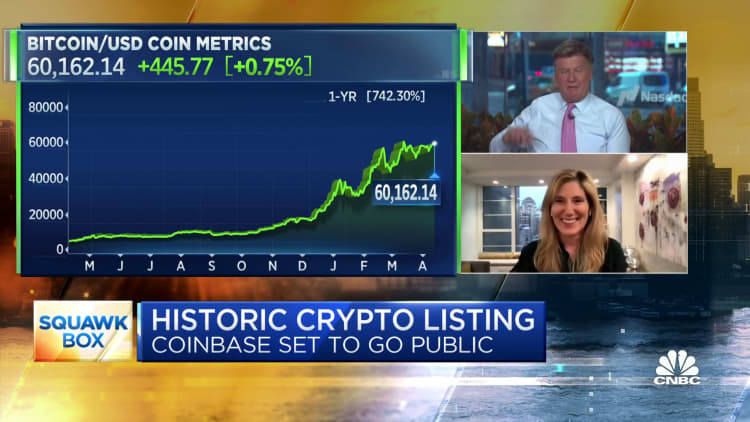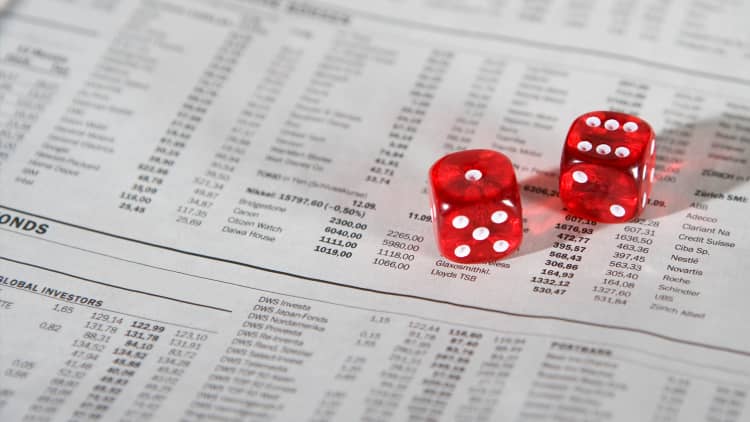
Southeast Asia's ride-hailing giant Grab announced Tuesday it is set to go public through a SPAC merger with Altimeter Growth Corp., in a deal that values the company at $39.6 billion — the largest blank-check merger to date.
Grab says it intends to list on the Nasdaq under ticker symbol GRAB following the deal's completion.
Special purpose acquisition companies are shell companies set up to raise capital to acquire private companies. A SPAC listing bypasses Wall Street's traditional IPO process. Altimeter Growth's stock rose more than 8% in premarket trading after the announcement, from its previous close of $13.95 a share.
As part of the deal, SoftBank-backed Grab will receive about $4.5 billion in cash, which includes $4 billion in a private investment in public equity arrangement, managed by BlackRock, Fidelity, T. Rowe Price, Morgan Stanley's Counterpoint Global fund and Singapore's sovereign wealth fund Temasek. PIPEs are mechanisms for companies to raise capital from a select group of investors that make the final market debut possible through their financing.
"I remember years ago when we were talking to investors, some folks didn't even know where Southeast Asia was on a map," Grab co-founder and CEO Anthony Tan said Tuesday on CNBC's "Squawk Box."
"So, today as we announce what is expected to be the largest U.S. equity offering in Southeast Asia ... it shows validation of the tremendous offering right here in this region, and that the 'super app' strategy works."
Grab, ranked No. 16 on last year's CNBC Disruptor 50 list, delivers an array of digital services such as transportation, food delivery, hotel bookings, online banking, mobile payments and insurance services from its app — thus the "super app" title. It operates in most of Southeast Asia, serving more than 187 million users in over 350 cities across eight countries.

While SPACs have become a hot investment vehicle on Wall Street, they're also gaining traction in Asia with six regional-focused SPAC companies that have collectively raised $2.7 billion thus far in 2021.
But in the first quarter this year, capital raised by blank-check firms like Altimeter has already outpaced 2020's total issuance. It has not only drawn the attention of the U.S. Securities and Exchange Commission, but also investors who are fearful of a market bubble.
Still, new deals continue to flood the market — more than 100 in March alone, according to SPAC Research.
"We found this was the better way to IPO," Tan said Tuesday of the decision he claims his company has been weighing over the last year. "They [Altimeter] committed more than 15% of our PIPE, and that shows real commitment ... we've been able to secure a world-class, day-one cap table of all investors" involved with the company.
While Grab's merger remains record setting, Boston-based biotech company Ginkgo Bioworks, ranked No. 44 on last year's CNBC Disruptor 50 list, is said to be considering an equally massive $20 billion blank-check merger of its own, according to Bloomberg.

Throughout the pandemic, Southeast Asia saw a surge in the use of digital services like e-commerce, food delivery and online payments. As many as 40 million people in six countries across the region — Singapore, Malaysia, Indonesia, the Philippines, Vietnam and Thailand — came online for the first time in 2020, according to a report from Google, Temasek Holdings and Bain & Company.
Still, Covid-19 has forced regional private market decacorns (start-ups valued at more than $10 billion) to cut staff and rethink what will define a dominant super app suite of on-demand services. It has also intensified the competitive landscape in an already-saturated market that has proven difficult to turn a profit.
After a period of intense and expensive competition by Uber to dominate ride sharing in many markets, it sold its Southeast Asia business to Grab three years ago in return for a stake in the company.
"Even in the toughest times during Covid, we've been able to pivot our driver supply to other jobs," Tan said Tuesday. "There's no one country that makes up more than 35% of our total revenues, so having that resilience and regional diversification has really helped us."

In January, Reuters reported that Grab's net revenue had grown 70% year over year, recovering to pre-pandemic levels with its ride-hailing business breaking even in all operating markets, including its largest, Indonesia.
Grab and Indonesia-based rival Gojek were reportedly close to finalizing a merger of their own late last year.
Reuters reported last week that Gojek — which ranked No. 10 on last year's CNBC Disruptor 50 list — is now in advanced talks with Indonesian e-commerce leader Tokopedia for an $18 billion merger, ahead of a potential dual listing in Jakarta and the U.S.
Pending shareholder approval, that deal could be finalized in the "next few weeks," according to a source familiar with the matter.






